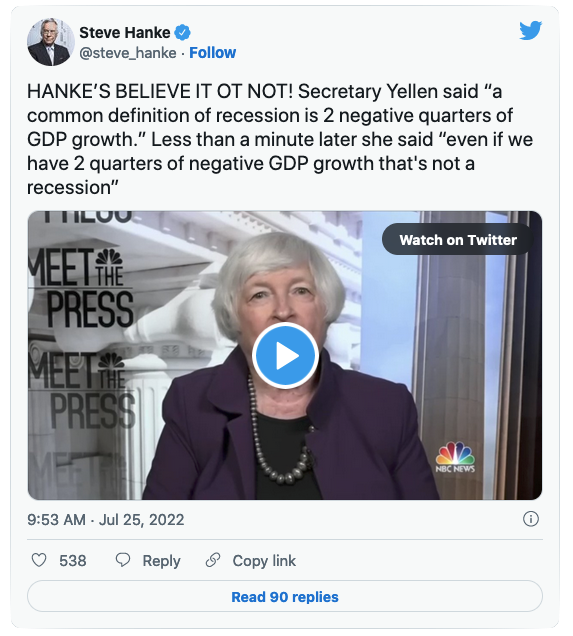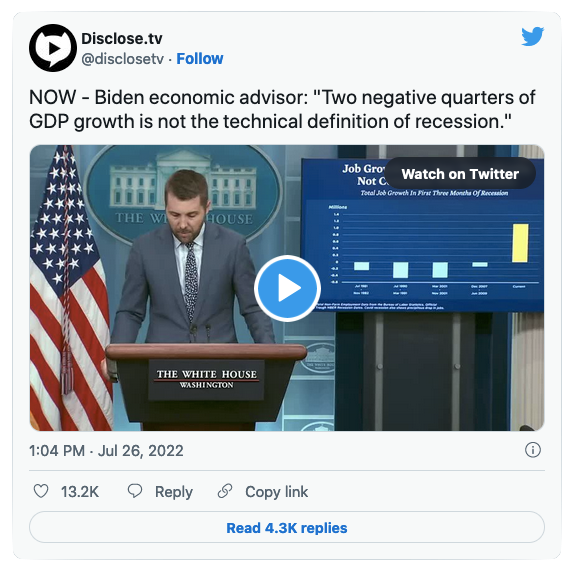The Aviation Industry Must Not Mistake A Recession

Over the past few months we have written in this newsletter about various economic challenges for the aviation industry. These range from the heavy use of debt by key players in the industry to an outright economic crisis. In this article we want to share an article about recession, in order to give an understanding of what a recession is. Lately there’s been a lot of talk around the definition of recession which in many ways has confused the general public. For those who operate in the aviation industry, it can be fatal to confuse what a recession is, since a recession can be the death knell of businesses operating within this industry.
For more readings on economic challenges and the aviation industry see: ‘3 Ways Aviation Businesses Are Coping With Inflation’, ‘The Aviation Industry and Economic Uncertainties’, ‘Inflation: Higher costs and their effects on Flight Schools’, ‘High Interest Rates/Cost of Borrowing and Their Effects on Aviation Businesses’,’Debt: Its effects on the Aviation Industry’, ‘Economic Crisis and the Aviation Industry’, ‘Inflation and Aviation’, ‘How The Aviation Industry Needs To Look At Inflation’.
_________________
In September 2008, the worsening global financial crisis hit a new phase when Lehman Brothers collapsed and it became undeniable that “hard times” had arrived for most ordinary people. By then, the unemployment rate had been climbing for months, foreclosures had skyrocketed, and the yield curve had been inverted through much of
2006 and 2007. Months later, the National Bureau of Economic Research (NBER) declared that what we now call “the Great Recession” had begun in December 2007. In other words, by the time a recession was declared, the US had already been going down that road for nearly a year.
Yet, right up until Black Monday 2008, it remained controversial to say that the US economy was in recession. As late as August 2008, then presidential candidate John McCain repeatedly declared the US economy to be in good shape, and Federal Reserve chairman Ben Bernanke denied any recession was in progress. Of course they said these things. Political expedience demanded it.
The gaslighting and ignorance of the “experts” and the policy makers in 2008 provides some helpful context to Treasury secretary Janet Yellen’s effort this week to control the narrative over what a recession is. With midterm elections only a few months away, the Biden administration is attempting to control who uses the word “recession” and when. This will become even more politically important as Americans continue to face ongoing threats to their standards of living in the current age of inflation and stagnating wages.
Yellen Declares: There Is No Recession
On Meet the Press on Sunday, Yellen set to work preemptively downplaying any additional economic news that might suggest the US economy is in recession. The context is this: the federal government’s official figures showed negative GDP (gross domestic product) growth for the first quarter of this year. Many analysts strongly suspect that the GDP numbers for the second quarter will be negative as well. For instance, the Atlanta Federal Reserve Bank’s “Nowcast” has been predicting negative GDP growth for the second quarter report for weeks. If the number does come in negative, then the commonly understood definition of recession—two quarters of negative GDP growth—will have many people saying the US economy is in recession.
Yellen, of course, doesn’t want that to happen, so she has been insisting that “what a recession really means is a broad-based contraction in the economy, and even if that [second-quarter GDP] number is negative, we are not in a recession now. I would warn that we should be not characterizing that as a recession.”
The NBC host pushed back on this, questioning how Yellen could suddenly change “the technical definition of a recession.” Yellen replied that the two-quarters-of-negative-growth standard was not actually the “technical definition,” and this line was further pushed by a White House spokesman today:
What Is a Recession?
They’re not actually lying when they say that the two-quarter definition is not the “technical definition” of a recession. The NBER’s definition is much broader. For example, the 2001 recession did not feature two quarters of negative GDP growth.
In fact, there is no “technical definition” of a recession at all. The two-quarters definition is purely arbitrary and hardly based on some sort of economic law. It’s something economists made up. It is a commonly used definition of recession, to be sure, and a Google search of articles on recessions published prior to 2022 shows that both economists and pundits have routinely used the two-quarters-of-contraction definition. But that doesn’t make it some kind of immutable standard for whether an economy is in recession.
The word itself is not technical. “Recession” became a popular word to describe economic downturns because in the mid-twentieth century, regime pundits and propagandists deemed the word “depression” too dour and unpleasant. This idea likely came out of the “accentuate the positive” craze that was employed to curtail criticism of the regime during the Second World War. So, “patriotism” demanded the United States stopped having depressions and start having recessions in the 1950s. For most people nowadays, though, the word simply means “the economy is lousy and times are bad.” That’s how most people understand it. Economists don’t have—nor should they be allowed to have—a monopoly on using the word.
It should not surprise us, then, that Janet Yellen is going on TV to argue about what the word actually means. With midterm elections looming, the administration doesn’t want the word “recession” to become the go-to word for describing the state of the economy. Naturally, people like Yellen would prefer terms like “transition” or “challenges.” But from the point of view of political optics, “recession” is obviously a nonstarter. Yellen wants to get control over both how recession is defined, and who gets to define it.
Recessions Are “Officially” Declared Long after the Fact
But even if next month’s federal data declares that GDP contracted again in the second quarter, that won’t mean the NBER will be issuing a press release on whether a recession has started. As the 2008 experience reminds us, the NBER can take many months to issue its opinion on whether the country’s in a recession. By then, a recession may have already come and gone. Or we may be months into a recession without any official declaration from the NBER or anyone else.
This lag is why then Fed chairman Bernanke could still get away with saying in January 2008—when the US was already in recession according to the NBER—”the Federal Reserve is not currently forecasting a recession” and then in June 2008 declaring that “the risk that the economy has entered a substantial downturn appears to have diminished over the past month or so.”
These declarations were spectacularly wrong, but Bernanke could make them and not be laughed out of the room because the “official” start date of the recession was not yet published.
A Lack of an Official Recession Doesn’t Mean Everything Is Fine
The main problem with Yellen’s claims on Meet the Press was not her definition of recession. It’s the context she is working within: a situation in which so much discourse over the state of the economy accepts the idea that unless a tiny group of economists at the NBER decides the US economy is “in recession,” things are more or less fine. It is entirely possible that months from now, the NBER might declare that the US was not in recession in the first half of 2022, or did not enter recession at all in 2022. So will this mean everything was fine in 2022 and we’re wrong to regard the “Biden economy” as a period of economic decline? Certainly not. We don’t need a recession to know that ordinary American workers are falling behind as inflation continues to outpace wages. We don’t need an “official” recession to see that the number of employed workers has stagnated. We don’t need the NBER to tell us that the standard of living is declining as food and rent inflation forces more Americans to pile up credit card debt and spend down savings. That’s all happening right now, regardless of whether or not some economists can agree on what a recession is.
Yellen wants to keep the word “recession” out of the headlines, but if wages continue to fall behind inflation, and if the GDP numbers do show another contraction in the second quarter, it will be increasingly hard to declare the current state of the economy as an “expansion” just because some economists say so.
_________________
This article was originally published in the Mises Wire on July 26, 2022, with the title “Yellen: “Recession” Doesn’t Mean What You Think It Means”.
_____________________
Author:
Ryan McMaken
Ryan McMaken (@ryanmcmaken) is a senior editor at the Mises Institute. Send him your article submissions for the Mises Wire and Power and Market, but read article guidelines first. Ryan has a bachelor’s degree in economics and a master’s degree in public policy and international relations from the University of Colorado. He was a housing economist for the State of Colorado. He is the author of Commie Cowboys: The Bourgeoisie and the Nation-State in the Western Genre.
________________________
Thank you for reading this week’s On Aviation™ full article. Do you believe that the U.S. is in a recession? Please share your thoughts in the comments below and remember to continue the conversation on our Twitter and Instagram.







